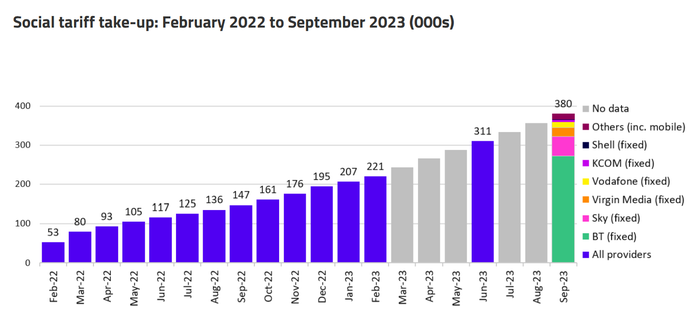Ofcom wants to ban inflation-linked price hikesOfcom wants to ban inflation-linked price hikes
UK comms regulator Ofcom is keen to ban inflation-linked mid-contract price rises in a bid to provide UK consumers with greater clarity on what their mobile and broadband bills will look like.
December 12, 2023

Before we all get too excited, it's important to note firstly that this is just a proposal from the regulator at this stage, and secondly, that it will not put a block on mid-contract price rises altogether. If it gets the go-ahead, Ofcom intends to make comms providers spell out upcoming price rises written into contracts in pounds and pence, rather than the current 'inflation plus X%' model.
This is not about keeping prices down for consumers. It's about customers understanding what they are in for and having the information to enable them to seek out a better deal, should they so desire.
"At a time when household finances are under serious strain, customers need prices to be crystal clear. But most people are left confused by the sheer complexity and unpredictability of inflation-linked price rise terms written into their contract, which undermines customers’ ability to shop around," said Ofcom CEO Dame Melanie Dawes.
"Our tougher protections would ban this practice once and for all, giving customers the clarity and certainty they need to secure the best deal for their needs and budget," Dawes said.
Ofcom floated the idea of blocking inflation-linked price rises back in February and since then has undertaken research that backed up its assertion that customers were unclear on the rules, and therefore on what they might have to pay.
As of April, four in ten broadband customers – that's translates to 11 million – and over half of mobile customers (36 million) had signed up to contracts subject to inflation-linked price rises, Ofcom said. It expects that number to grow to 60% of both fixed broadband and mobile customers following Three and Virgin Media's move to inflation-linked rises for more customers in 2023-24.
However, more than half of broadband and pay monthly mobile customers – 55% and 58% respectively – do not know what standard measures of inflation like CPI and RPI actually are. And only 16% of broadband customers signed up to contracts with inflation-linked rises, and 12% of mobile customers, were both aware of the price rise and able to identify that their deal was inflation-linked with an additional percentage, Ofcom explained.
All of which shows that essentially UK customers are not clear on the terms of their contracts. Indeed, the number of complaints the regulator received about price rises doubled to 800 in the January-to-October period, compared with the same months in 2021.
As a result, Ofcom is taking action. It will run a consultation through to 13 February next year with a view to making a final decision in spring, and putting the new rules in place about four months after that. So we're probably looking at late summer/early autumn for the change to come into force.
That has to be good news for consumers looking to shave a few quid from their bills here and there to help cope with the increased cost of living.
On a related note, Ofcom revealed that take-up of social tariffs, designed to help those in receipt of benefits with lower-cost broadband, has increased considerably – to 380,000 in September 2023, up from 147,000 a year earlier – but is still concerned that awareness remains low. Just 8.3% of households eligible for social tariffs have taken them up, while 55% do not even know that they exist.
For the first time the regulator has published operator-by-operator data on the take-up of social tariffs, presumably as a further prod to the telcos to raise awareness.

BT and Sky account for the vast majority of subscriptions (see chart), but the regulator notes that this is partly a function of the length of time they have been offering social tariffs for. BT's size clearly comes into play too. Virgin Media, which last week announced a social tariffs marketing campaign and shared plans to extend the offer to mobile customers, ranks third. And Ofcom names and shames TalkTalk as the only major broadband provider not to offer a social tariff.
It did not pass further comment on that point, but this is probably not the last we will hear of it.
About the Author
You May Also Like










.png?width=300&auto=webp&quality=80&disable=upscale)


_1.jpg?width=300&auto=webp&quality=80&disable=upscale)